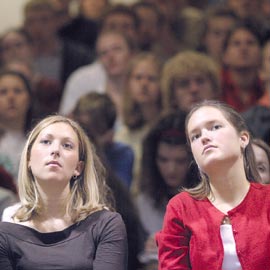 |


|
Autumn 2003 | Volume 26, Number 4 | Features
| ||||||
| In Praise of Responsible Curiosity
Medina Helps SPU Celebrate Innovative Thinking During the Day of Common Learning ON OCTOBER 22, 2003, no classes were held at
Seattle Pacific University — but classrooms were still filled
to overflowing. SPU’s second annual Day of Common Learning
began with developmental molecular biologist John Medina urging
students to celebrate what he called “responsible curiosity” and
the rewards that come from “thinking out of the box.”
“In most academic programs, we’re separated by status, discipline and department,” says Susan Gallagher, director of the Center for Scholarship and Faculty Development at Seattle Pacific. “During the Day of Common Learning, students, faculty and staff sit together in classrooms around campus talking about the same topic. This year was so much fun that we’re already brain-storming about the topic for next year.” Medina, founding director of Talaris Research Institute in Seattle, held his Brougham audience in rapt attention. “I was looking forward to his lecture,” says English major Rachael Darden, “but I didn’t expect to be as engaged as I was. He was very animated and that, along with the information he presented, made me want to learn more about his research.” Medina’s childhood had a profound effect on his choice to become a scientist. His father was a career U.S. Air Force officer, and his mother was an actress-turned-fourth-grade-teacher, whom he credits for fostering his curiosity. Medina says that when he was a toddler, his mother noticed subjects in which he was interested — and took action. If he mentioned dinosaurs, she’d fill the house with them. “There would be pictures of dinosaurs and figures that I could hold,” he recalls. “And we would do dinosaur sounds, and she would try to make dinosaur food.” When he developed an interest in space, his mother went into high gear again. “All the dinosaur stuff would come down and, guess what, all the astronomy stuff would go up,” he says. Investigating facts and ideas “was not only not scary, it was cool,” he says. “I have never been able to shake that.” Today, Medina and wife Kari, who directs evening worship at Seattle’s University Presbyterian Church, encourage curiosity in their two sons. Ages 6 and 3, the boys have 600 square feet of space in their home devoted to their curiosity. “Right now we’re on a unit I call ‘origins,’ where we’re talking about the Big Bang, galaxies, planets and whatnots,” says Medina. Up until the 1990s, Medina was a faculty member in the Department of Bioengineering at the University of Washington School of Medicine. Then a presentation he made to U.S. governors on early child-hood learning caught the attention of the Apex Foundation, the philanthropic organization of Bruce and Jolene McCaw. Impressed by his call to unite brain and education research, the Foundation announced a $25 million gift to help start the Talaris Research Institute. In 2000, Medina became founding director of the Institute, which is dedicated to exploring how children think and learn. A two-time recipient of the Bioengineering Student Association Teacher of the Year Award, Medina is also a consultant for the Education Commission of the States and a frequent on-air commentator for radio and television. His books include The Genetic Inferno, Inside the Seven Deadly Sins and Depression: How It Happens, How It Heals. Medina says he wants Christians to understand that scientific literacy is vital — and he’s helping to spread the word. Since 1994, he and Earl Palmer, senior pastor of Seattle’s University Presbyterian Church, have taught popular five-week seminars on topics such as science, art, parenting and more. “John Medina is that marvelous mix of brilliance, Christ-centered faithfulness, interpersonal enthusiasm and sheer whimsy — all together in one man,” says Palmer. Medina not only took part in SPU’s Day of Common Learning, but he also spoke at the Science Building dedication in September. “The Science Building is a great witness — both to the community of faith and to the secular world — that religion and science don’t have to be fighting,” he says. “I am really excited about the directions SPU is taking.” — BY HOPE MCPHERSON — PHOTO BY MIKE SIEGEL
|
|
